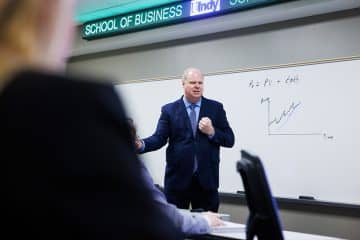Traditional MBA Rankings: Lists of Prestige over Students’ Needs
If you’re thinking about getting an MBA, chances are you’ve come across multiple lists claiming to know which MBA program is the best. College rankings are pervasive, even at the graduate level. And while some sites can offer valuable insight into what a program is like, too many focus on prestige over a student’s needs. The result is a seemingly arbitrary list that ignores the unique attributes and functions of various models that serve different audiences.
Traditional hierarchical rankings use statistics that can be and, in some rare cases, have been manipulated to achieve a higher ranking. Such statistics as selectivity, student-faculty ratio, and standardized test scores fail to account fully for the unique experiences, faculty, and opportunities that different MBA programs offer.
Here at Abound, we know that no two students are exactly the same (oftentimes, they’re not even comparable!). That does not make one better than the other—just different. We believe colleges and universities are the same way. Each institution has something different to offer their students, and while we recognize these schools for their excellence, we understand that not every student will thrive there. That is why we avoid the traditional hierarchical ranking. Rather, we take a holistic approach to evaluating a school and highlight unique programs, outstanding faculty, experiential learning opportunities, and other high-impact practices. Above all, we recognize schools that demonstrate a commitment to the four A’s: accessibility, affordability, acceleration, and advancement.
- Accessibility: MBA students are often working professionals who are looking to balance their existing work or family obligations with their education. Accessible programs make sure that students can access online and on-campus resources at their convenience to ensure success. These programs have classes taught completely online, on campus in the evenings, or in a hybrid format to accommodate the busy schedules of its students.
- Affordability: Abound believes in transparency on all fronts, especially when it comes to cost. These institutions have clearly communicated the financial commitment from cost per credit hour, books, and other expenses. Many Abound institutions are committed to offering financial aid, reduced tuition, scholarships, grants, and tuition assistance programs to adult students whenever possible.
- Acceleration: These institutions are committed to helping students get their degree as efficiently and cost-effectively as possible. With accelerated programs and shorter sessions offered year-round, students can more quickly get out of the classroom and into the boardroom.
- Advancement: These institutions are champions of student success. A student’s academic, personal, and professional goals are the utmost priority. Students have access to dedicated staff, both on campus and online, who are ready to help them realize and achieve their goals. These institutions employ and support faculty who lead cutting-edge programs and are constantly advancing their pedagogy to match the changing global marketplace. High-impact practices like experiential learning and collaborative projects ensure that students get real-world experience. These institutions regularly strengthen program standards, learning outcomes, and faculty development.
With so many sources offering their own versions of “the best MBA” lists, how do you know which one to trust? The answer is different for every student. Motives for getting an MBA are as varied and diverse as the students who earn one. Consider why or even how you are getting an MBA to determine which is right for you. At Abound: MBA, our cohort of schools are all unique in their own ways. And while a few schools might be perfect for some, some might not be perfect for you. That’s why our selection is so varied! No matter what, you can count on all of them being accessible, affordable, accelerated, and advanced.





